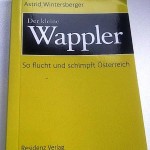“Because in the end, you won’t remember the time you spent working in the office or mowing your lawn.” – Jack Kerouac
 This past week I was struck by the tragic news of the trekkers in Nepal who had gotten caught in a sudden snow storm while attempting to traverse the Thorung La Pass on the Annapurna Circuit.
This past week I was struck by the tragic news of the trekkers in Nepal who had gotten caught in a sudden snow storm while attempting to traverse the Thorung La Pass on the Annapurna Circuit.
Ages ago, I too had been faced with the challenge of overcoming Thorung La’s 5416 meter high peak.
For Austrians, der Berg always seems to be a’callin’. You’d be hard-pressed to find an Austrian whose DNA isn’t filled with mountain air and hiking blood.
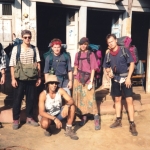
Group of 6 hikers from 4 countries at Annapurna Circuit Trail Head, Sept many many years ago
Whether they are out admiring fields of wild crocuses in spring, hiking to the snowy rocky peaks in summer, welcoming the cows back from the Alms in fall or snowboarding down them at neck-breaking speed in winter, Austrians are always finding excuses to go to the mountains.
And if you spend enough time here, you will be dragged along too. Dragged until you come to realize the very civilized traditions they cultivate for the the fine art of hiking – Alms.
Yes, they’ve placed Alms at most peaks – sometimes several along a trail — so that you, weary hiker, are duly rewarded with some Bergkäse, freshly baked bread and Bier once you reach the top. That and a Schnaps.
But as much as they love the mountains and being rewarded for hikes, the Austrians know and respect the inherent dangers of their beloved peaks. Austrian radio will report snow falls and avalanche dangers throughout the year and no Austrian in his or her right mind would ever leave the trail head without proper equipment and preparation. And when someone ventures on some mountain in flip-flops, the rescue effort invariably makes the news along with ample attention given to the details (sometimes with photos) of the poor preparation of the idiot tourist who went out in shorts and sandals with no water, gear or food.
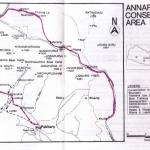
Annapurna Circuit
Me? I hail from city of steel and bridges. Pennsylvania has hoagies and chipped ham sandwiches, but mountains? So when I moved to Austria, I had a lot to learn. So much in fact that I could eventually rattle off terms like “Gletscherspalte” and not readily know the English translation for it — glacier cleft?
For this reason, when I ventured the Annapurna Circuit trekking route many moons ago, I was uneasy. The circuit winds through the Annapurna mountain range in the Nepalese Himalayas with stops along the way in remote villages where you can eat and spend the night.
The trek takes 18 – 21 days, and for 200 miles, you lug your pack through tropical jungles which lead into dry land in the shadow of the Himalayas and eventually high alpine terrain which then circles back down again to drier land and lush fields.
In his book about trekking, David Nolan writes about the attitude necessary to enjoy a trek. One must have the “ability to shrug off – or even relish — minor hardships.” He even uses the words “stoicism in the face of difficulty” and a “willingness to suck it up.” And some days you have to “suck it up” quite a bit. The trail isn’t for the faint of heart and most people who ventured on it were well prepared. At least back then they were and I assume today isn’t much different.
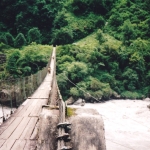
Annapurna Circuit Hanging Bridges
The group of us who had happened to meet up in the village at the trail head were small but amiable and we would meet up for the next three weeks in various villages at various times throughout our hike. A growing bond formed at these meet ups that would increasingly last late into the night as we shared tales about hanging bridges and the impressive loads of the “Tigers of Snow”. Though I started the hike rather slow, and most of the others fast, after a few days, they slowed and I picked up speed until eventually, at the base camp before the daunting pass, we all met up again.
We were weary from 10+ days of 8+ hour a day treks and apprehensive about the 5416 m (17,777 ft) pending peak. Everyone had heard the horrifying tales of trekkers who had died of altitude sickness, of the guy who had to help carry the girlfriend who didn’t make it back down the trail. The nationality and circumstances of the victims often changed, depending who was telling the story, but the message was always loud and clear — the mountains deserved respect and sometimes, things happen beyond your control and there is nothing you can do about it.
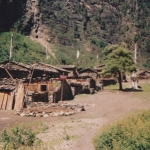
Village Along Annapurna Circuit
As I watched the images on CNN of the Nepalese soldiers loading stretchers on the helicopters and could spy the brightly colored woolen caps sticking out from under the black plastic tarps, my mind returned to my own trek and I couldn’t help but wonder, seeing all that deep snow, if any of us would have survived. The trek was and remains one of the most amazing life experiences I have ever had. It was one of the hardest but most rewarding things I have ever forced myself to do.
My heart goes out to the families of those trekkers who didn’t make it and I am rather certain, every trekker from all over the world who has ever ventured that pass feels a bond thinking of them.
NOTES ON THORUNG LA PASS FROM MY TREKKING JOURNAL
DAY 10 Phedi, meaning foot of hill (someone’s idea of a joke like calling the Danube ‘Blue’) is far more rotten than Mr. Oregon described. Initially vehemently opposed to the idea of rushing over the 5416 m high “hill”, preferring a day to rest and acclimatize, I have experienced a drastic change of heart. I want to get out of this place as soon as possible and we will join the Germans – Andre and Christian — and the Dane with his Sherpa guide, Tok, to go over tomorrow.
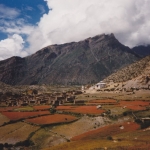
Annapurna Circuit Village
Tok is a great guy who spends his hours coaxing everyone to eat raw cloves of garlic to help our bodies produce more red blood cells which are responsible for transporting and distributing oxygen throughout the body. Either that or he is on a crusade to scare off all the vampires from here to Kathmandu and produce extremely foul smelling gastrointestinal winds. Did I mention how absolutely uninviting and cheerless the base camp is? The prices are extremely inflated and stretching our budgets. I doubt any place in the world exists where instant noodles are more costly. To quote another hiker’s eloquent but poignant observation describing our current state of affairs, “We are freezing our asses off at 4500 meters high.”
DAY 11 Phedi – Muktinath
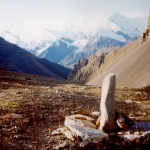
Thorung La Pass Marker
Thorung La Pass
The big day! After a polar night without sleep in a concrete room with two cots and only sleeping bags for warmth, we awoke at 4 am to a dark sky full of more stars than I had ever seen in my life. Grateful to have survived what seems to have been quarters designed as the cool house, we go into the lodge at 4:30 am and order breakfast.
By 5:30 we are inching our way up the pass. The air is crisp and we are all wearing every single piece of clothing we have in our packs – too much to freeze to death yet not enough to keep warm. My Tibetan llama wool sweaters prove a good investment. In the south, the snow-covered peaks of Gangapurna and Annapurna III majestically dominate the dawning sky. As the sky lightens, the sun’s golden rays highlight the mountains making a beautiful backdrop with tones of red, orange and purple contrasting the white snow-crusted peaks. The path is dangerously steep and the air thin. We proceed at a snail’s pace because it is impossible to breathe and walk fast. None of us is showing any signs of altitude sickness. The morning is clear and beautiful. The further we climb, the more mountains we see.
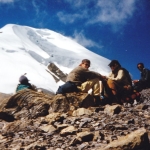
Thorung La Pass Annapurna Circuit
False peaks have become the bane of my existence – elevations that taunt us from afar, leading us to believe that the actual peak is close because nothing seems to be higher. Yet once we reach the area, we realize the actual peak is still further on. I concentrate on placing one foot ahead of the other. I stop every 20 paces to catch my breath. I muster what seems every last bit of energy and determination to manage each additional step. I scan the landscape for a rock to rest without any luck. I fear, anyway, that if I were to take a break, I would fail to find the stamina necessary to continue.
At 10:30 and not a minute too soon, we finally reach the peak of Thorung La – 5416 meters high and marked by prayer flags strung from a pile of rocks!!!
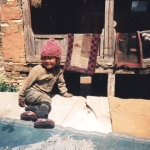
Child in High Mountain Village Annapurna Circuit
We’ve made it!
Two Nepali tradesmen sit leisurely having their lunch beside their donkey – for them probably just one of several visits to the top. Yet we don’t let this dampen our sense of accomplishment. They greet us with a wave and then it is our turn to take possession of the rounded hilltop, stacked with stones and strewn with prayer flags tattered from flapping in the wind.
We all huddle on the peak, on top of our packs and shield our faces from the stinging Himalayan wind with scarves. Our eyes are protected from the glaring sunlight with sunglasses. The peak is a mixture of brown interspersed with patches of white snow.
The break proves more amusing than originally anticipated thanks to the Dane forcing poor Tok to document his hundreds of macho poses next to the marker. He is exemplary of a postcard I have describing all the characteristics of a perfect European. For example, the perfect European should cook like a Brit, drive like a Italian, have the patience of an Austrian, the sense of humor of a German and the modesty of the Dane. He is so into his photography session that we suspect he has hired Tok — not as a guide – but rather as a photographer.
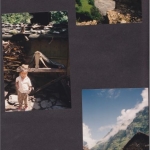
Annapurna Circuit Album
With the Dane’s film out and our entertainment at an end, I sit on my backpack and enjoy the view and inactivity of my muscles. After about a half an hour, however, we notice that our clothes, wet with sweat and windbreakers thin, are not meant for long leisurely hangouts at the top of such a high peak. We all start to feel the chill of the wind biting at our bones.
Slowly we begin our descent. My knees ache. I try to adjust my walking, rolling from my inner soles to my outer soles instead of my heel to my forefeet. This doesn’t help. After about an hour, the snow dirt becomes dirt with a bit of grass. Another hour passes and we are hiking through a dark green grassy knoll resembling the postcards I have seen of Scotland. Large white rocks adorn the landscape and sheep graze about lazily.
Muktinath is 3800 meters high and we have a good 1600 altitude meters down – very steep – and our legs hurt more than when we climbed up. About 3 pm, totally exhausted and starving, we finally reach Muktinath. Oh – the wondrous sight of Muktinath.
As we lumber into the town of a hundred waters, we pass villagers carrying on with their daily routines. I try not to let their lack of enthusiasm sober my spirits. Throughout life, I have done many seemingly non-extraordinary things. I have let out high-pitched squeaks playing clarinet in our middle school band’s rendition of “Lady”; mumbled entire stanzas of “Flashdance” during the spring choral concert. I have stuttered through public speeches and nearly truncated fellow baton dancers during what was supposed to be a throw, spin, catch number. Throughout and unfailingly, unabashed innocent bystanders have shamelessly applauded for each and every one of these feats. And now – now after what may very well prove to be one of my greatest feats, I stumble onward without notice. Perhaps the moment of my greatest personal triumph, no one ventures to drop a hoe or release a donkey rein to clap or give a weak hoop of cheer. And why should they? Crazy foreigners. So I plod after the rest of our group, too elated, exhausted and hungry to think while we search for a place to dine and sleep in the holy mountainous village of Muktinath.
We parade to the same hotel where it’s rumored that we’ll find — of all things — Mexican food. We drop our bags in the dorm and trudge to the dining room. We all order beer and Schnapps. Goose bumps drape my limbs and I hunker into myself trying to warm my weary body as we wait for the rice and beans to arrive. Almost asleep before the food is served, I force myself to eat at least half but it’s useless. My desire to sleep surpasses my desire to celebrate. I wish everyone much mirth and merriment as I announce that I am off to bed. I lug my iron feet back to the dorm and am fast asleep before my head hits the pillow. Never in my life have I been more physically burned out. Each of my muscles ache in competition for my undivided attention but I don’t have the strength to notice. 
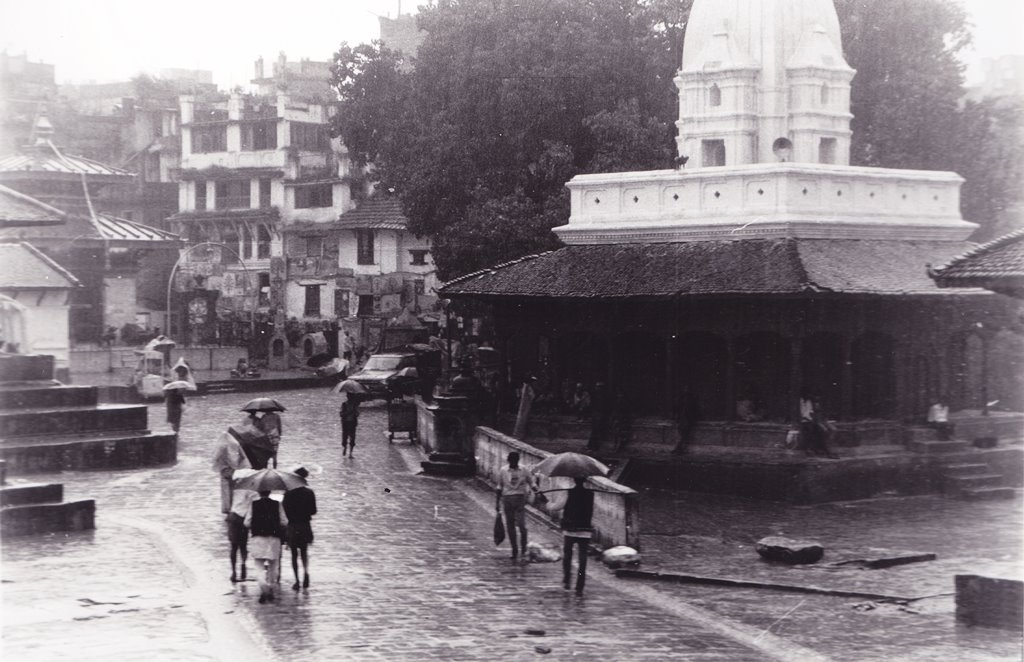
Kathmandu in Rain
Kathmandu in Rain
Photo by GG
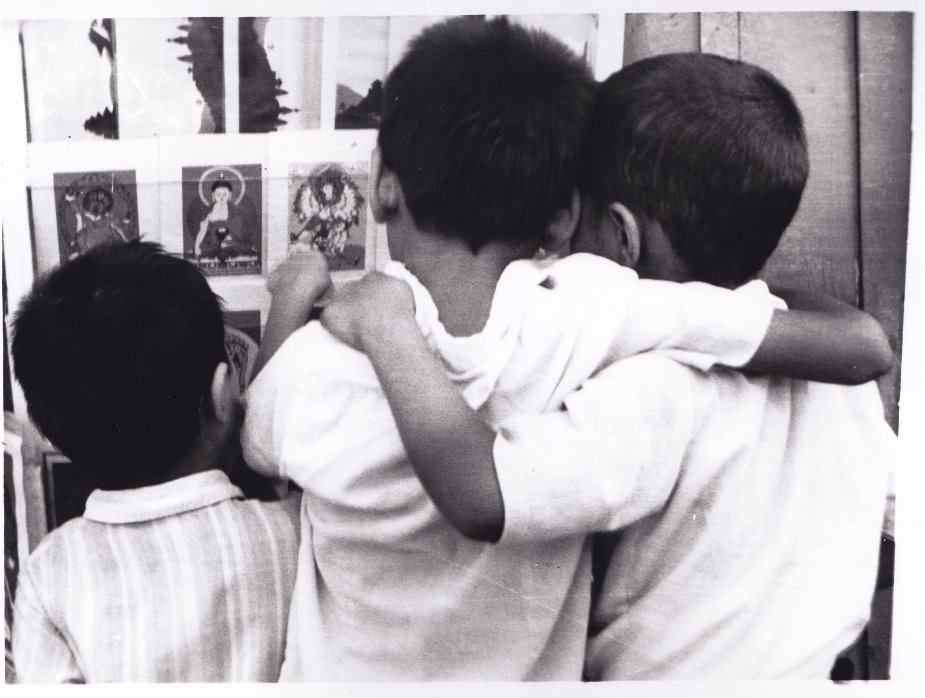
Boys in Kathmandu
Boys in Kathmandu discussing Gods
Photo by GG
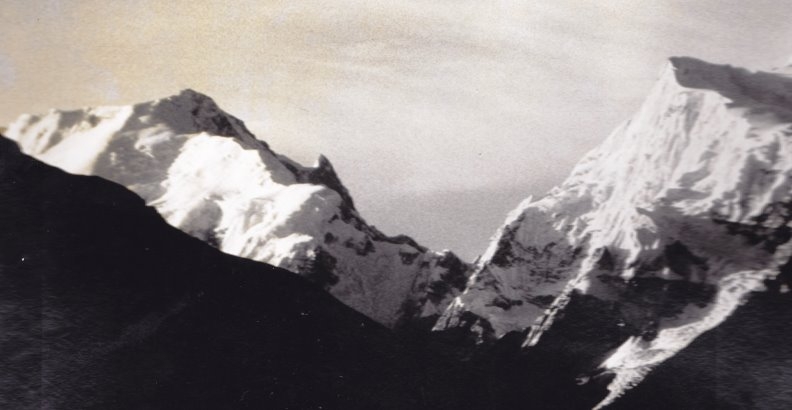
AnnapurnaCircuit_0001
View of Mountains Annapurna Circuit
Photo by GG
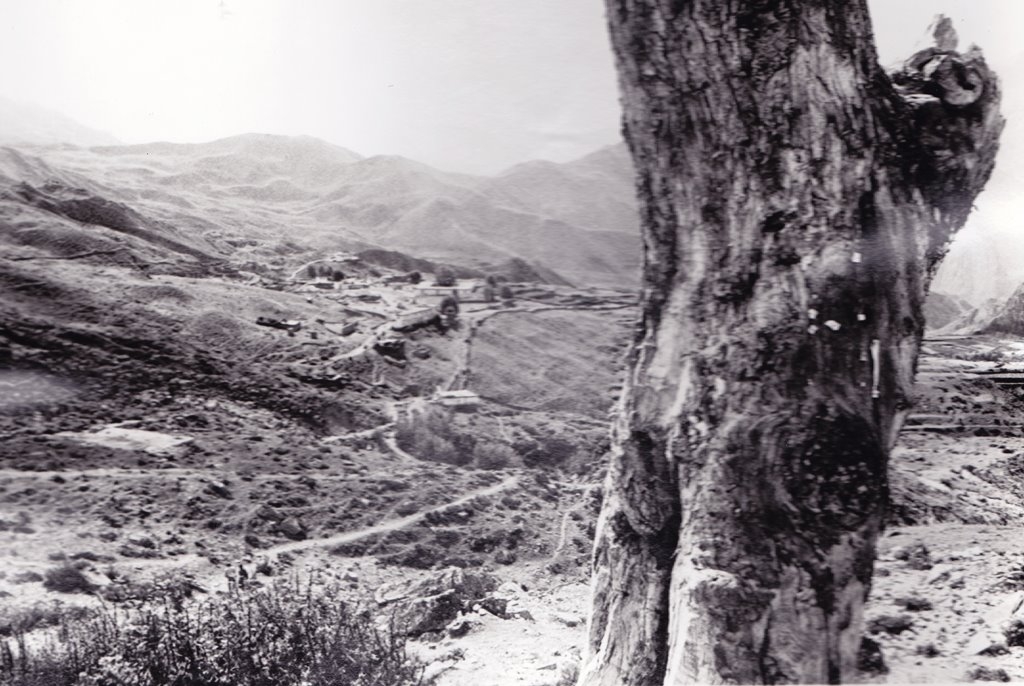
AnnapurnaCircuit_BW
Annapurna Circuit Trail
Photo by GG
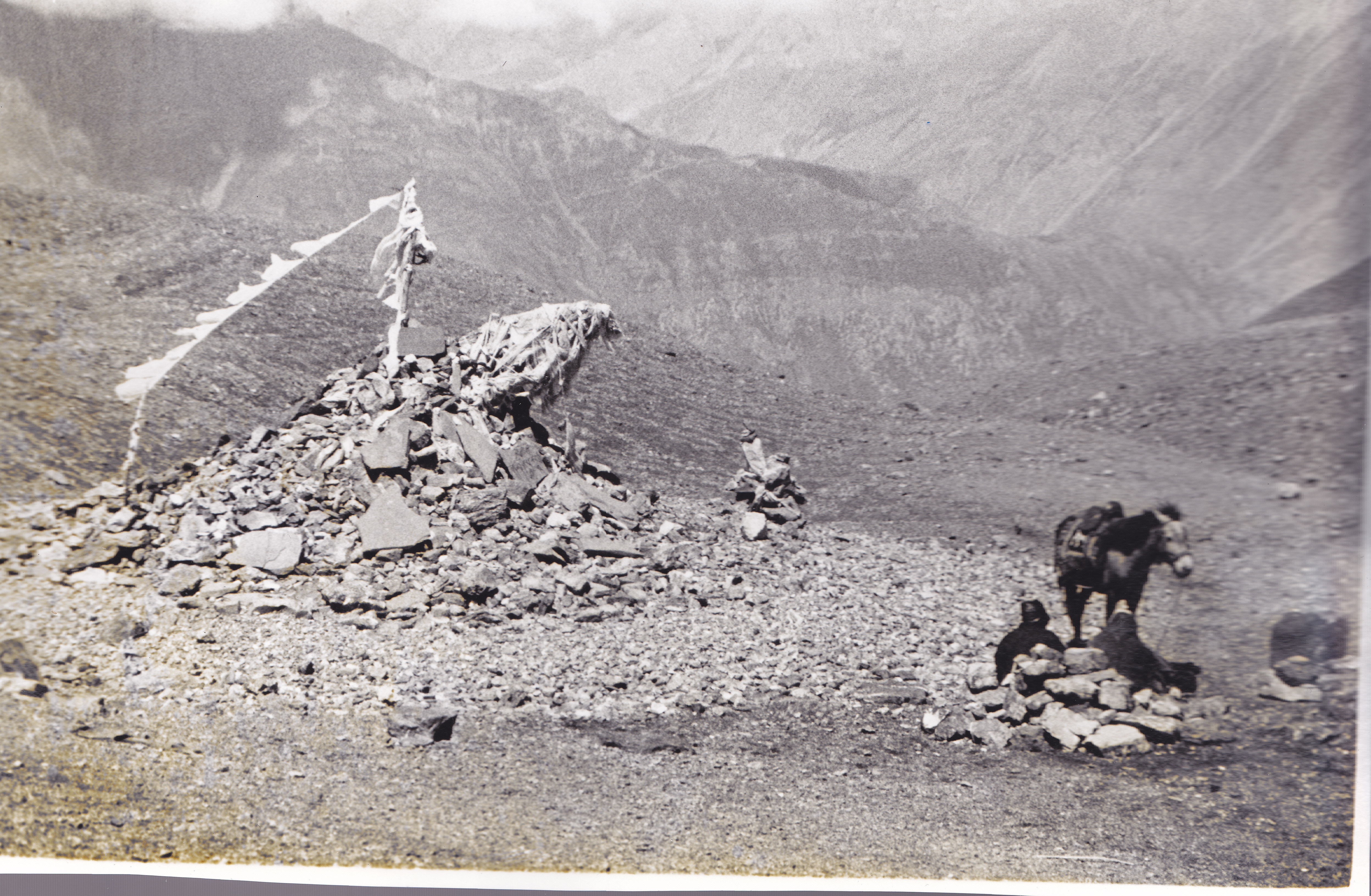
Thorong Pass Peak
Thorung Pass Peak
Photo by GG
 Hatscher: of course the the Alpine country of Edelweiss and happy cows crazing around the verdant slopes of the Almhütten has a ranting term for a really really super long hike or walk – and that is a Hatscher.
Hatscher: of course the the Alpine country of Edelweiss and happy cows crazing around the verdant slopes of the Almhütten has a ranting term for a really really super long hike or walk – and that is a Hatscher.

